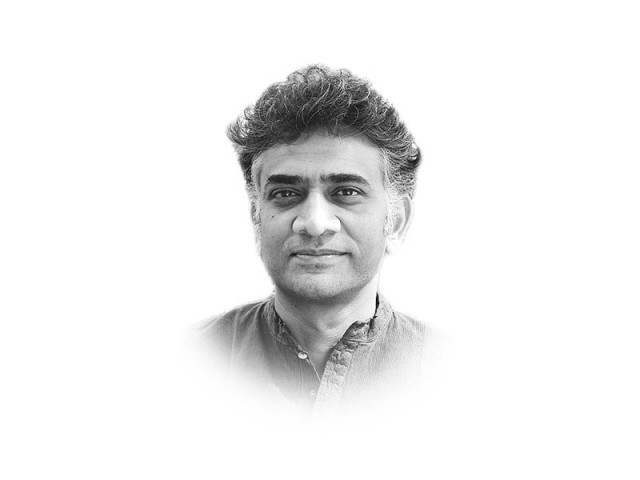India’s only option: talks
India has to talk because it is in its interest. Not talking does not stop terrorism

The writer is the editor and translator of Why I write: Essays by Saadat Hasan Manto, published by Westland in 2014. His book, India, Low Trust Society, will be published by Random House. He is Executive Director of Amnesty International India. The views expressed here are his own
aakar.patel@tribune.com.pk
Foreign policy usually is the domain of a handful of experts. Neither you nor I really know what the contours are of India's policy with New Zealand, Norway or Nigeria, nor do we care.
This lack of public interest gives those handful of experts and the politicians they report to flexibility and space. If there is a tweak or change needed in the way India deals with such nations, it is easy to bring about.
Sometimes, however, foreign policy comes into the popular domain. It forced itself into the American electoral space through the attacks of September 11. Nations that America had ignored for years needed to be aggressively engaged because of public pressure.
The country went to war because the population demanded retribution. Those politicians who may have otherwise counselled caution (like Hillary Clinton) were unable to resist. The fallout of those actions is still with us, and that is a different matter.
On Pakistan, India’s policy is, at the moment, in the popular domain. Two things have brought it there. The mischief in India by elements of the Pakistani state and the militias they have worked with for three decades is the first. This is episodic and the public interest in this (as represented by the number of television debates) waxes and wanes.
On the face of it, terror is not that big an issue for India. Leaving aside the conflict areas of Kashmir, the northeast and the Naxal belt, total terrorism fatalities in 2015 were 13, in 2014 they were four, in 2013 they were 25 and the year before that one. These numbers include those killed as terrorists. By any measure, terrorism is not a primary concern for Indians as the data show. Five lakh Indian children die each year of malnutrition, to put the numbers in perspective.
But we must accept that because at least some of it is deliberately exported to India, there will always be more anger associated with such events. Now there is a second aspect that has brought terrorism and our Pakistan policy into the public domain. That is the BJP's and particularly the Indian prime minister's insistence that previous governments were soft. A stronger posture (which the BJP will provide) will put an end to India’s problems.
Can it? The events have shown that the answer is no, and this was predictable. India’s options in dealing with Pakistan, or any other nation for that matter, are only three no matter what party rules the country: discussions, arbitration or war.
India can force Pakistan to submit through war, it can ask a third party or court to mediate its dispute or it can talk. There is no fourth option. The BJP convinced itself that not-talking was a kind of policy. It is not. It is merely a show of anger and irritation. It doesn't get India what it wants. Saying the 'ball is in Pakistan's court' after the Pathankot attack doesn’t really address anything.
India needs to engage with Pakistan because it needs something very specific from that country: ensuring that Pakistani nationals do not kill Indian nationals. There are other things it needs; for instance, access to and from Afghanistan and Iran and Central Asia. But these are secondary.
Of the three options available to India, war is out of question because of its mistake at Pokhran. Before 1998, we had a conventional weapons advantage over Pakistan which we squandered. We forced Nawaz Sharif to weaponise Pakistan's nuclear programme, and allowed it to advertise its deterrence at Chagai. Even if India wants to, it can no longer punish Pakistan with a short, sharp raid.
Those who say limited strikes are an option cannot guarantee that there will be no escalation. And it will take a particularly unhinged leader who will gamble with the lives of Indian citizens to secure a little military prestige.
India is against mediation by third parties and so that leaves only one option: to talk. India has to talk even when there are clear violations, as happened in Mumbai and Pathankot. India has to talk because it is in its interest. Not talking does not stop terrorism. Talking to Pakistan has many advantages including lessening the mindless artillery exchanges the two countries engage in all the time, costing civilian lives.
The idea of 'strong posture' was successfully sold by Modi to the Indian media and general population. This is now a liability for him, as he has discovered. If he clearly frames the problem and explains India’s options to the public directly, he will be able to reverse the prevailing opinion that the country has a fourth option when it comes to dealing with Pakistan. He retains immense credibility among Indians. He will have no problem successfully selling the reversal.
Published in The Express Tribune, January 10th, 2016.
Like Opinion & Editorial on Facebook, follow @ETOpEd on Twitter to receive all updates on all our daily pieces.















COMMENTS
Comments are moderated and generally will be posted if they are on-topic and not abusive.
For more information, please see our Comments FAQ